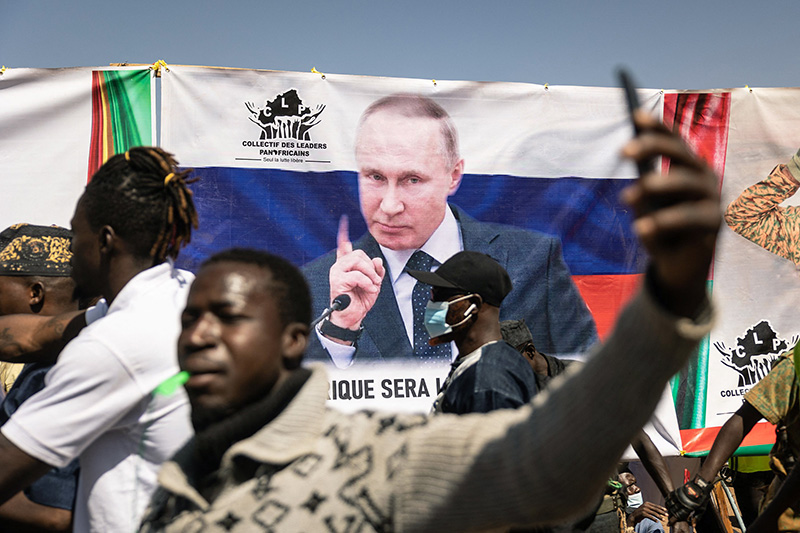 A banner of Vladimir Putin in Ouagadougou, Burkina Faso, in 2023.
A banner of Vladimir Putin in Ouagadougou, Burkina Faso, in 2023.
Photo: AFP
The black-and-red bulk carrier AT 27 arrived in Guinea on Africa’s west coast last month. On it was a typical cargo: 25,000 tons of wheat destined for Mali, a neighboring country that’s facing severe food insecurity.
The goods, though, were not part of any ordinary trade. The 170-meter-long ship docking in Conakry was one of several dispatching free grain promised by Russian President Vladimir Putin to six African countries. And the largesse comes with a different price, Bloomberg notes.
Along with security assistance, arms supplies and Russian-sponsored beauty pageants, the donations are part of the Kremlin’s efforts at closer ties with Africa. What Russia gets in return is support for its ambitions and access to markets that can potentially soften some more of the impact of US and European sanctions.
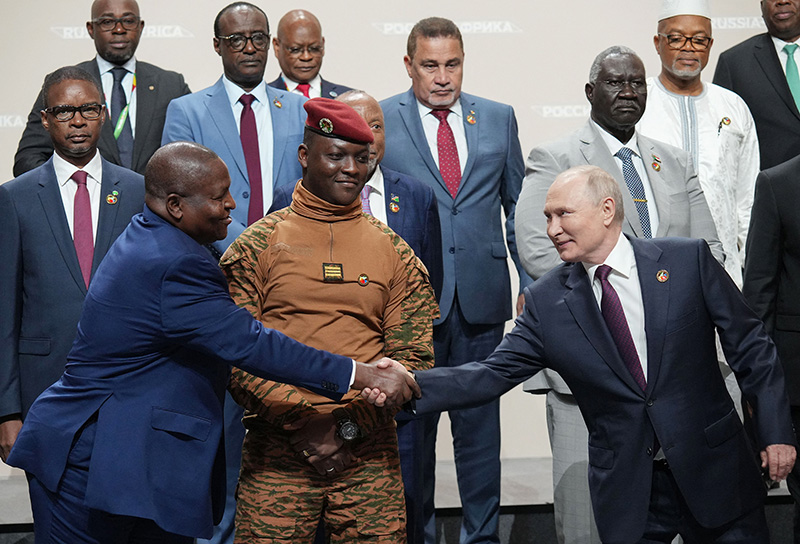 African leaders and heads of delegations with Putin at the Russia-Africa Summit in Saint Petersburg on July 28.
African leaders and heads of delegations with Putin at the Russia-Africa Summit in Saint Petersburg on July 28.
Photo: AFP
During the Russia-Africa summit last year, Putin promised up to 50,000 tons of free grain each for Burkina Faso, Zimbabwe, Mali, Somalia, Central African Republic and Eritrea, some of which have since reinforced their ties with Moscow. The Russian Agriculture Ministry said that 200,000 tons of “humanitarian aid for Africa” had been delivered.
In the past months, Burkina Faso has seen the arrival of Russian troops and Moscow opening an embassy. Mali, which has avoided criticizing the war in Ukraine, is getting a Russian-sponsored gold refinery.
Central African Republic is planning to host a Russian military base and has received weapons, security expertise and training. Eritrea voted against a UN General Assembly resolution demanding that Russia withdraw its troops from Ukraine.
Russian aid doesn’t necessarily go to the countries that need it the most, but to those who are Russia’s “best allies,” said Seidik Abba, who heads the CIRES think tank focusing on Africa’s Sahel region.
“Take Eritrea, poor, isolated and determined to oppose Western imperialism,” Abba said from Mauritania’s capital, Nouakchott. “Russia goes to these countries with strained relations with the West and it reinforces the political divides.”
Moscow forged relations with African nations during decolonization in the 1950s and 1960s, training Zimbabwean liberation fighters and providing military aid and scholarships for students from Mali and Burkina Faso to study at Soviet universities.
Leaders of those countries have highlighted those former relations as they have moved to cut ties with the West — mainly France — and the fact that Russia never colonized those countries.
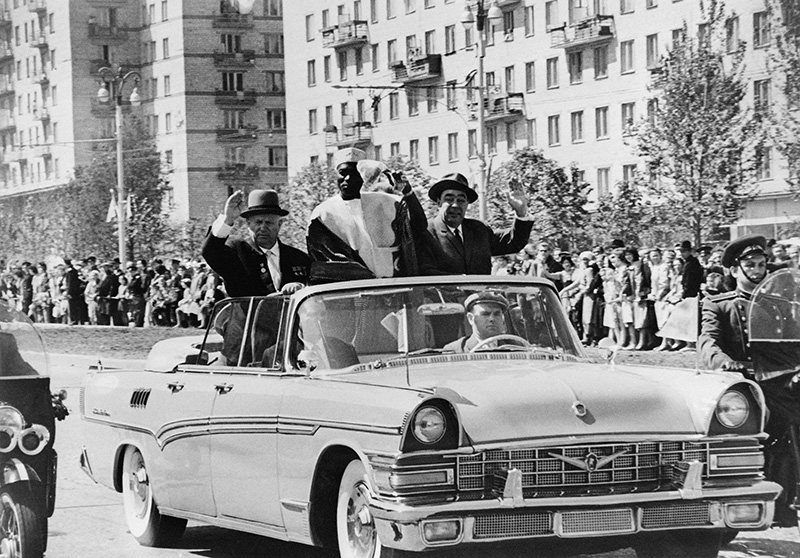 Mali President Modibo Keita with Nikita Khrushchev and Leonid Brezhnev in Moscow in 1962.
Mali President Modibo Keita with Nikita Khrushchev and Leonid Brezhnev in Moscow in 1962.
Photo: Keystone-France
Moscow’s recent donations are also reminiscent of the way that Washington used food as a tool of statecraft for decades, according to Jennifer Clapp, an academic who has written a book about food aid.
Now the world’s top wheat exporter, Russia is able to offer this surplus grain for free in part because of the Kremlin’s success in rebuilding it into an agricultural powerhouse in the past two decades.
Russia has a glut of grain after several bumper harvests, and the total promised by Putin is a share of Russia’s exports of 60 million tons. But publicity about the direct grain donations has helped give the impression that Russia is on Africa’s side, according to Abba at CIRES.
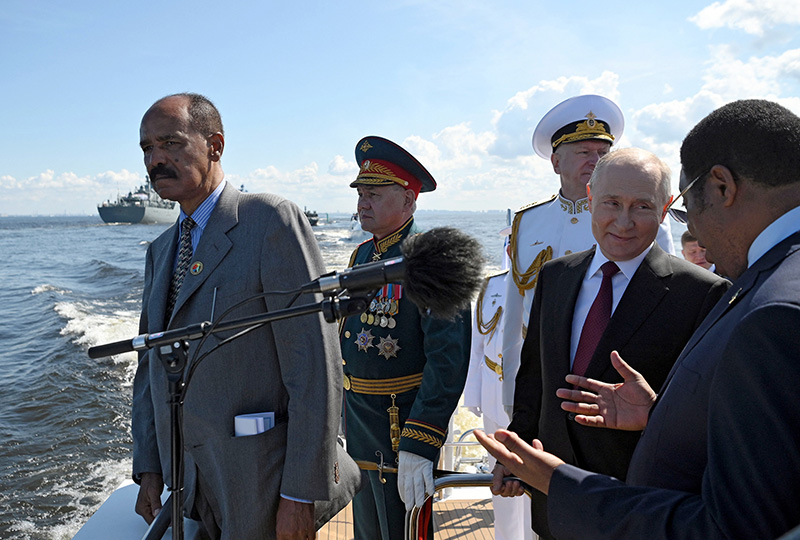 Eritrea's President Isaias Afwerki with Putin during the Navy Day parade in Saint Petersburg on July 30.
Eritrea's President Isaias Afwerki with Putin during the Navy Day parade in Saint Petersburg on July 30.
Photo: AFP
Food is not targeted by sanctions, though some Russian agricultural exporters faced financing and logistics issues in the immediate. Russian wheat exports have since hit record levels and fertilizer shipments have also recovered, reducing prices.
“Russia is the one that really acknowledges the struggle of Africans, who sees their difficulties,” Abba said.
Mali government has severed military ties with its former western allies and is moving closer to Russia. As in other countries across the region, Russian flags have become a symbol of anti-Western sentiment.
“For Russia, it’s goodwill — in the end it’s good PR for both countries,” Malian opposition leader Oumar Mariko said in an interview in Abidjan, Ivory Coast’s commercial capital.
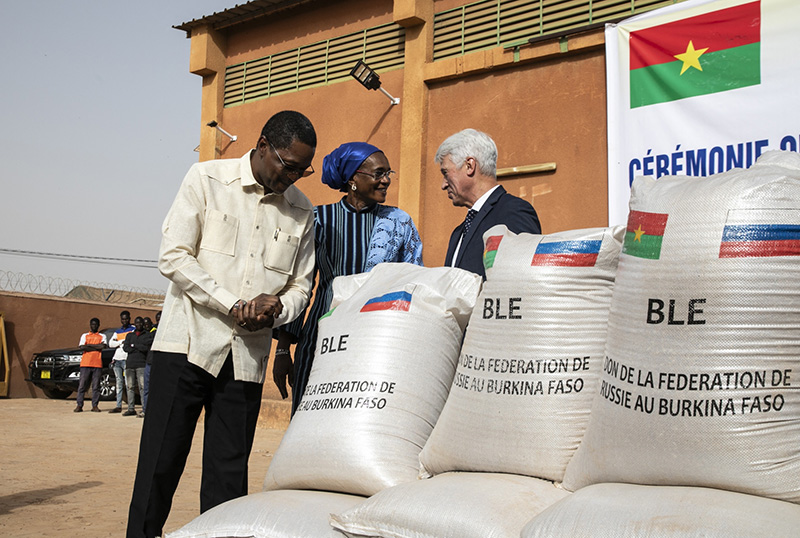 Burkina Faso marked the delivery of Russian wheat with an official ceremony in Ouagadougou on Jan. 26.
Burkina Faso marked the delivery of Russian wheat with an official ceremony in Ouagadougou on Jan. 26.
Photo: AFP
Russian state TV in the past month showed white bags of wheat marked “gift from the Russian Federation to Burkina Faso” and printed with the flags of both countries.
“It shows Russia’s solidarity for the Burkinabe people and the good, strong relations between our two countries,” Nandy Some-Diallo, Burkina Faso’s minister for solidarity and humanitarian action, said at a ceremony to mark the donation in January.
read more in our Telegram-channel https://t.me/The_International_Affairs

 9:24 27.02.2024 •
9:24 27.02.2024 •






















